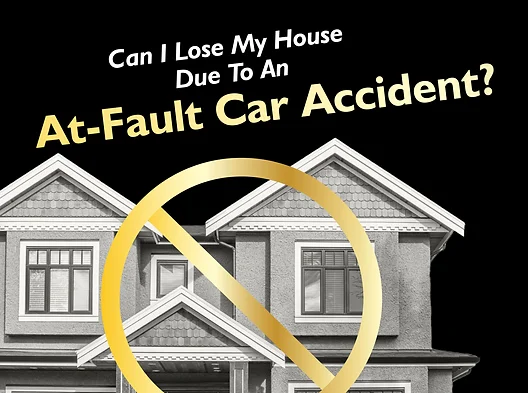After a car accident, there are typically a lot of questions that follow. Things such as how will my insurance company handle this situation? How am I going to pay my medical bills? What happens after the accident in general? Etc. All of these questions are important but what happens when you are the at-fault party? If you were wondering if that lawsuit that landed on your doorstep can lead to them going after your house, here’s your answer according to Florida law.
What To Do After an Accident Where You Were at Fault
No matter what circumstances led to the accident occurring, make sure you take the proper steps. If you are not at fault, try to contact a personal injury attorney and have them handle it. If you are at fault and got served a lawsuit there are certain things you are probably wondering about. Some of which can be, what can they go after? Is my insurance handling this or am I in need of an outside attorney? Let us answer some of these questions for you!
Insurance Policy Limits
One of the things we recommend to all of our clients is that they stay updated on their insurance policies and what coverages they have. It’s important to have a key understanding of these things to know how to respond after an accident occurs. Here are some guidelines for minimum coverages required by your insurance company:
Personal Injury Protection (PIP): Florida is a no-fault state, which means that each driver is generally required to carry Personal Injury Protection (PIP) coverage. PIP covers medical expenses, lost wages, and related costs regardless of who was at fault in the accident. The minimum PIP coverage limit in Florida is $10,000.
Property Damage Liability (PDL): Drivers in Florida are also required to carry Property Damage Liability coverage, which pays for damages you cause to someone else’s property. The minimum PDL coverage limit in Florida is $10,000.
A lot of drivers choose to carry higher coverage limits to provide additional protection in case of accidents. These things can take effect when it comes to a car accident case and pursuing a lawsuit, there are several potential sources that can be pursued for compensation beyond the insurance policy limits, including:
At-Fault Driver’s Liability Insurance: If the other driver is determined to be at fault, their liability insurance coverage may be pursued to compensate for damages, including medical expenses, property damage, and pain and suffering.
Uninsured/Underinsured Motorist Coverage (UM/UIM): If the at-fault driver is uninsured or does not have sufficient insurance coverage to compensate for your damages, you may be able to make a claim under your own UM/UIM coverage, if you have it.
Personal Assets: If the at-fault driver has personal assets that can be pursued, such as savings, property, or other valuables, a lawsuit can target those assets to seek compensation beyond the insurance limits.
Other Responsible Parties: In some cases, there may be other entities or individuals who share liability for the accident, such as vehicle manufacturers, government entities responsible for road maintenance, or employers in certain situations. A lawsuit can be pursued against these parties to seek additional compensation.
It’s important to consult with an attorney to understand the specific details of your case and to determine the appropriate course of action based on the circumstances and applicable laws at the time.
How to Protect Your Assets After a Car Accident
Having adequate liability insurance, including an umbrella policy, is paramount when it comes to safeguarding your assets against car accident liability. In most instances, when the injured party’s attorney evaluates their claim, they will typically settle for an amount within the defendant’s insurance limits. By settling through insurance, the car driver and owner are relieved of personal liability upon resolution and payment of the plaintiff’s claim.
However, there are scenarios where car accident cases escalate into lawsuits, especially if the at-fault driver carries minimum insurance or the defendant possesses significant unprotected assets. When the insurance policy fails to provide sufficient personal injury coverage, the injured party may pursue litigation and a money judgment, believing it to yield greater financial recovery than an insurance settlement.
To address this, defendants with inadequate insurance coverage should proactively implement properly planned asset protection strategies to mitigate the risk of personal judgment collection and enhance their negotiation position during the settlement process.
To protect your assets after a car accident, consider the following steps:
Engage in Dialogue with Your Insurance Carrier: Assess whether the estimated damages fall within your insurance policy limits. Understanding the potential coverage can inform your decisions and allow you to strategize effectively.
Identify Protected Assets: Determine which assets are shielded from collection in the event that the injured party succeeds in a lawsuit. Awareness of protected assets can help guide your asset protection plan.
Develop a Comprehensive Asset Protection Plan: Take proactive measures to safeguard vulnerable assets. This may involve exploring various strategies offered by Florida statutes and common law that align with your specific circumstances.
Submit a Financial Affidavit: Present a financial affidavit that demonstrates the potential difficulty in collecting a money judgment against your assets. This can strengthen your position and dissuade the injured party from pursuing litigation as a means of maximizing recovery.
The key to asset protection lies in promptly leveraging the protections offered by Florida statutes and common law. By taking swift action, you can proactively secure your assets and minimize the potential impact of car accident-related liabilities.
Remember, consulting with a knowledgeable attorney experienced in asset protection and car accident liability in Florida is essential to tailor a strategy that suits your unique situation. Their expertise will empower you to navigate the complexities of asset protection and secure your financial well-being in the aftermath of a car accident.
If You Are Being Sued for a Car Accident, What Can They Take?
Florida law equips judgment creditors with a range of tools to pursue personal money judgments resulting from car accident lawsuits. Such tools enable the creditor to access vital financial documents of the debtor, including bank records, tax returns, and wage statements. Depositions under oath grant the judgment creditor detailed insights into the debtor’s financial history and assets.
As such, attempting to hide assets from potential judgment creditors is not a viable asset protection strategy.
One of the most potent methods employed by plaintiff creditors to collect car accident judgment money is through writs of garnishment. By obtaining a writ of garnishment from the court clerk and serving it on the debtor’s bank, the creditor can freeze accounts bearing the debtor’s name. Subsequently, the bank responds formally, revealing the account titles and balances at the time of garnishment.
However, debtors can contest the garnishment freeze by demonstrating that the funds are exempt under Florida law, such as social security, disability, or annuity proceeds.
Wage garnishment is another effective tool wherein the creditor can direct the debtor’s employer to withhold up to 25% of the debtor’s wages, net of tax withholding, and other deductions, until the debt is cleared. Head-of-household debtors typically enjoy exemptions from wage garnishment under Florida law.
Additionally, wages deposited into a bank account maintain their exempt status for up to six months if the debtor qualifies as head of the family. Debtors may also explore defenses based on procedural defects in the creditor’s garnishment process.
Certain scenarios provide exemptions from garnishment: jointly owned bank accounts with non-debtor spouses as tenants by entirety, and accounts containing funds exempt from collection.
Understanding Florida’s creditor collection tools and exemptions is crucial for both debtors and creditors involved in car accident lawsuits. Seeking guidance from knowledgeable legal professionals can help debtors explore appropriate defenses and creditors navigate the collection process effectively.
Does Florida Protect At-Fault Drivers From Losing Their Homes?
Rest assured, in Florida, your home remains secure even in the aftermath of an at-fault car accident. The Florida homestead exemption stands strong as a shield, offering substantial protection for the home of the at-fault driver.
Under this exemption, your home is safeguarded with an unlimited amount of value, granting peace of mind amidst challenging circumstances. The homestead exemption applies to houses situated on a half-acre lot in a city or up to 160 acres in an unincorporated county, providing ample coverage for most residential properties.
Moreover, other exemptions work in favor of protecting the at-fault driver’s home, including the tenants by entireties protection. These additional safeguards bolster the assurance that your home remains beyond the reach of creditor claims.
With these robust protections in place, you can face the aftermath of a car accident with greater confidence, knowing that your cherished home remains safe and secure. As always, seeking guidance from experienced legal professionals will help you navigate the complexities of Florida’s homestead and property protection laws effectively.



